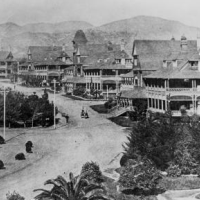Court Rules VA Is Misusing Sprawling L.A. Site, but Offers No Remedy
 Old Soldiers Home in Los Angeles 1892 (photo: courtesy of Carolina Barrie)
Old Soldiers Home in Los Angeles 1892 (photo: courtesy of Carolina Barrie)
A federal judge last week gave the U.S. Department of Veterans Affairs (VA) six months to find a better use for its 386-acre campus in the middle of Los Angeles than lease agreements with Sodexho Marriott Laundry Services, Twentieth Century Fox Television, a private school, and the like.
U.S. District Judge S. James Otero suggested that, perhaps, a better use for its ample vacant land might include housing and health care for the 6,300 homeless veterans (down from 8,000 a few years ago) wandering the streets of the city, since that was the original agreement struck with donors of the land in 1887.
The judge’s ruling came in response to a lawsuit filed in June 2011 by the American Civil Liberties Union Foundation of Southern California and others that alleged the VA violated federal law when it leased portions of its West Los Angeles campus to 11 businesses and organizations that had nothing to do with helping veterans. The VA argued that the revenues it received indirectly helped the vets by swelling the government coffers.
Judge Otero agreed with the plaintiffs and voided nine lease agreements, pending further action. The ruling applies to the 50-year-old Jackie Robinson Stadium (home of the UCLA Bruins baseball team), a 20-acre parcel used by the private Brentwood School for its athletic complex, practice fields for a private soccer club, Fox studio production storage facilities, a laundry processing facility for nearby luxury hotels, a farmers’ market and a 15-acre parcel used by community groups for events.
As to what purposes the land might be devoted in the future remains unknown. The devil is in the details and right now, there are no details. It is still not known if the VA will appeal the judge’s ruling or what alternatives it might propose. Efforts to develop new veterans facilities in the past proved unsuccessful. A housing project announced in 2007 to utilize three abandoned buildings went nowhere.
Bobby Shriver, former mayor of nearby Santa Monica and long-term advocate for better use of the VA property, sounded a note of optimism: “The vets finally won one. Instead of wasting more time appealing Judge Otero’s excellent decision, the government should immediately spend their energy creating housing and services for the men and women suffering from severe PTSD who, today and tonight, are living in dumpsters all over Los Angeles.”
The lawsuit was joined early on by Carolina Winston Barrie, the great-great niece of Arcadia Bandini de Baker, one of the land donors. Barrie wanted the original deed, which dictated the land be used to “locate, establish, construct and permanently maintain such branch of said National Home for Disabled Volunteer Soldiers,” to be honored.
The clear intent was that the land be used for veterans. And for awhile, that’s just how it was used. It was a fully functional little village, with a trolley, a post office and a chapel—all facilitating the care of disabled veterans.
The VA has gotten aggressive in the past decade about developing new revenue streams on one of the most valuable pieces of undeveloped real estate in the city. Although grand plans for dense projects haven’t materialized, it still managed to make between $28 million and $40 million from long-term lease agreements, according to information obtained by National Public Radio (NPR) via the Freedom of Information Act.
–Ken Broder
To Learn More:
Federal Judge Rules VA Misused Its Sprawling West L.A. Campus (by Gale Holland, Los Angeles Times)
Judge Rules Veterans Affairs Misused Land Designated for Homeless Veterans in West L.A. (American Civil Liberties Union of Southern California)
Gregory Valentini et al v. Eric Shinseki et al (U.S. District Court for the Central District of California)
8,000 Homeless Vets in L.A. Excluded from Rented-Out VA Campus (by Ken Broder, AllGov California)
VA Facility in West Los Angeles Abandons Homeless Veterans—Lawsuit Challenges VA’s Misuse of Land Given to House Injured Vets (American Civil Liberties Union)
VA Leases Land Meant for Disabled Vets to Oil Company and Other Private Businesses (by David Wallechinsky and Noel Brinkerhoff, AllGov)
- Top Stories
- Controversies
- Where is the Money Going?
- California and the Nation
- Appointments and Resignations
- Unusual News
- Latest News
- California Forbids U.S. Immigration Agents from Pretending to be Police
- California Lawmakers Urged to Strip “Self-Dealing” Tax Board of Its Duties
- Big Oil’s Grip on California
- Santa Cruz Police See Homeland Security Betrayal in Use of Gang Roundup as Cover for Immigration Raid
- Oil Companies Face Deadline to Stop Polluting California Groundwater





